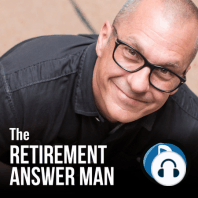40 min listen

Classic Episodes: What’s Wrong with Index-Based Investments?
Classic Episodes: What’s Wrong with Index-Based Investments?
ratings:
Length:
38 minutes
Released:
Oct 30, 2019
Format:
Podcast episode
Description
Do you use index-based investments? There is a trend towards passive investing as people are stepping away from high fee managed funds. There are many positives in passive, index-based investments, but there are some downsides too. In this classic episode, we explore the downfalls that can come with index-based investments. If you are on the passive investing bandwagon you’ll want to discover what the negatives are to have all the information and make intelligent decisions. Should we all move to passive investing? Passive based investing seems to be taking over the investment management world. In 2000 only 12% of stock market investment assets were passive based. In 2005 that number rose to 17%, in 2010 it rose again to 25%. In 2016 the percentage of passive based investments rose to 42%. Although the number of passive investments has still not caught up with active investments, the trend is heading that way. Over the past 10 years, the S&P 500 outperformed hedge funds. Active stock managers have failed to beat their indexes over the previous years and they continually lose money. Since they charge high fees and lose money does that mean we should all move to passive investing? Does index-based investing make the market less efficient or more efficient? We know how efficient index-based investments can be. Taking out the middle man of stock managers streamlines the entire process and make investing much less expensive. But is it actually more efficient? Might passive investing be less efficient because if so much of every dollar is going into the same indices? The average buyer is buying without respect to any fundamentals of investing. We also need to consider that all of this money is going to the same companies. The largest companies have the largest influence on the index. 20-30 companies influence the whole index. More and more money is flowing to fewer and fewer stocks as index-based investing gets bigger. What will happen when we enter a bear market? We all know that markets rise and fall. After being in a bull market for so long we know that a bear market is sure to follow. But if all of our assets are funneled into fewer and fewer stocks what will happen when the bottom falls out? In bad markets investors sell. This will cause these large companies’ stocks that are tied to these investments to all even further. You’ll want to consider a solution I have for continuing small-fee, indexed based investing. Make sure to listen in to find out what you can do to protect yourself in a bear market and still passively invest. Should Tyler use future raises to pay down debt? What should you do when you get a raise? How do you allocate that money to support your family? One listener is considering what to do with new income when he gets a raise. I encourage you to think about income from a net worth perspective. There are only 5 things you can do with money: spend it, give it away, pay down debt, save it, or invest it. It’s helpful to think of things in that order. Look at your net worth statement ot identify where the imbalances might be. Focus on what you can control because we will always be living in uncertain political times. Listen to this episode to hear more great listener questions. OUTLINE OF THIS EPISODE OF THE RETIREMENT ANSWER MAN HOT TOPIC SEGMENT [3:36] Should we all move to passive investing? [8:00] Does passive investing make the market less efficient or more efficient? [10:59] What will happen when we enter a bear market? [12:45] What are the solutions? PRACTICAL PLANNING SEGMENT [16:32] Should Tyler use future raises to pay down debt? [22:45] What are red flags to look for when hiring a financial advisor? [32:22] Should Keith pay off mortgages or save for retirement? [34:33] Timothy has an RMD question Resources Mentioned In This Episode Rock Retirement Club Roger’s YouTube Channel - Roger That BOOK - Rock Retirement by Roger Whitney Work with Roger Roger’s Retirement Learning Center
Released:
Oct 30, 2019
Format:
Podcast episode
Titles in the series (100)
Yes, 27 Year Olds Think About Retirement Too: Jordan's Journey to Retirement by Retirement Answer Man